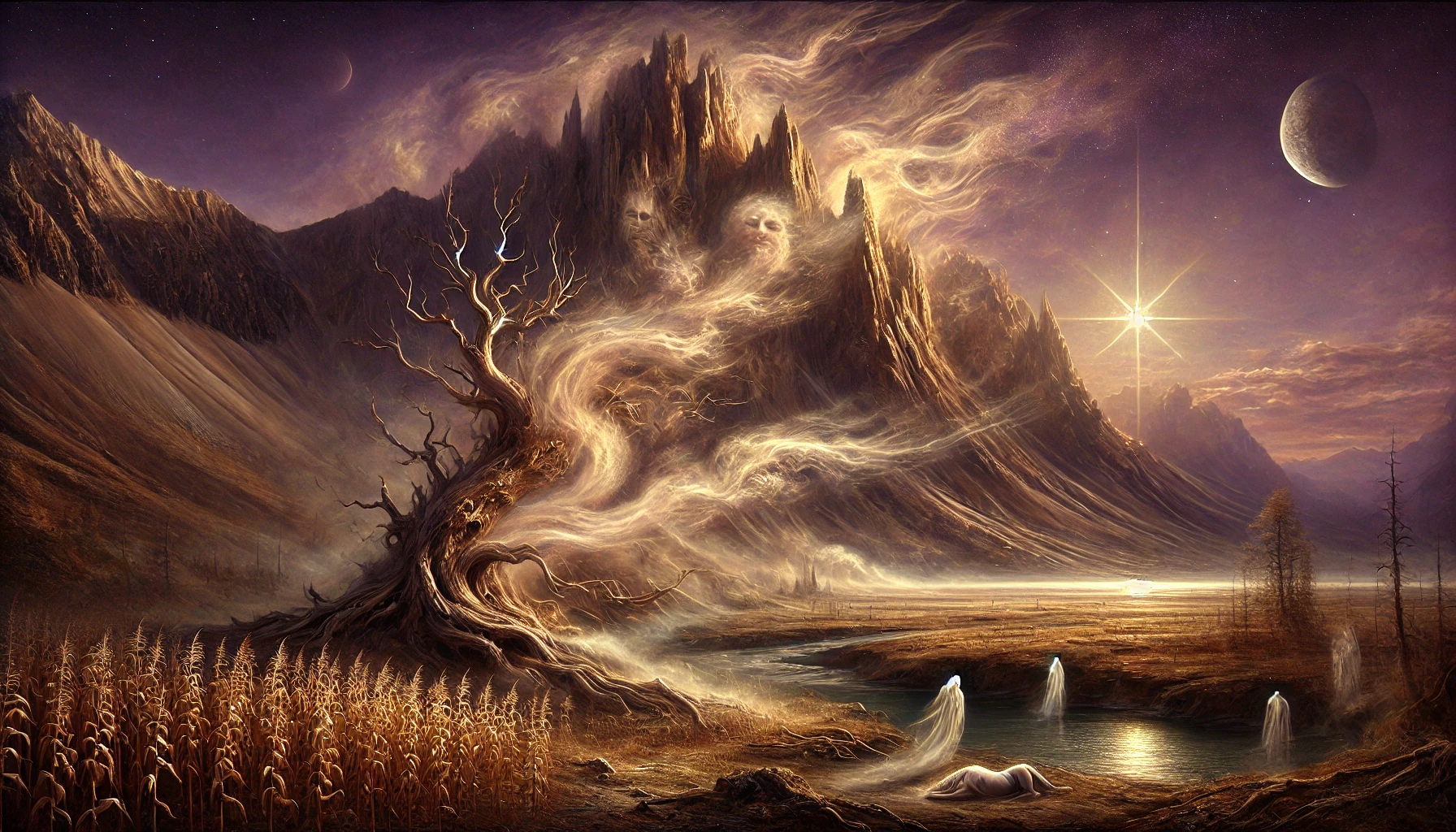“Dissolve” by Sherwin Bitsui
This mountain stands near us: mountaining.
It mistakes morning with mourning,
when we wear slippers of steam
to erase our carbon footprint.
Wind’s fingers wearing yours.
you unravel a plough of harvested light
notice its embers,
when scribbled on drowned faces—
repel fossilized wind.
Bluing under a dimming North Star,
the Reservation’s ghosts
paws cartilage pincered from a digital cloud.
Its gnawed bones’ opaque sighs—
the pallor of bleached wasp eggs,
throbs on tree knobs
penciled in with burnt ivory smell.
Rising out of the uranium pond—
home picks: bird flight
from a cartouche box,
it then becomes a chain of floating islands.
Slipping into free-fall,
we drip-pattern: the somewhere parts,
our shoulders dissolving
in somewhere mud.
The arcing sun whistles
across the mask’s abalone brow,
its blurring pouts into a forest
chirping from the lake’s bite marks
stamped vertically on this map’s
windowsill.
Kneeling our thoughts on ellipses
evaporating from ollas of fragrant wet clay—
we saddle the drowning’s slippery rim.
Father’s dying ceased,
when he refunded this ours
for fused hands plaster-coated
in a glottal stop’s brief paralysis.
Pinpricked holes for eyes,
reversible teeth hemmed in copper thread,
polished brow-bone swiveling
through trimmed hedges—
he atrophies this aftermath,
its highest frond withering on maps
that dreamed our shadows waterlogged.
He then howls a constellation of anchors
flung at blue birds pausing mid-flight
where pewter wind
creaks shut over the raft’s hesitation.
He explains the sun,
not carried by horse,
but a ceiling lamp
flickering on our computer screens.
Mother threw a platter
of blind spots on her son,
without knowing that bees
ached in her feet.
The beads of her breath
sank into his chest—
he kept them for five long years.
A tassel of singed hair cinched
around his wrists,
key latches soothing songbirds
in his pockets of fire—
he stains the night’s rim
with sprigs of dry air
exiting fevering bodies
cupped briefly by their itching.
She dabs clear his brow,
remembers: syringes filled with lake mist,
wonders if it was him
who strung teeth marks
across her wrist the night before.
Together, they pace
the ravine’s gauge nearing empty,
step upon a pale horse
lying on the earth’s heat,
legs upright in the cattle guard,
butcher paper stretched taut over wiry ribs.
Its gasping sent them barreling
back toward the awakened cornfield.
Somewhere, between,
they leapt back into their bodies,
they didn’t recognize their own voices.
Her apparition ferries
the flowers of their bruises back to the severing.
The bullwhip’s knotted eye turns toward her and
only her.
When fences come to suckle,
where will her mind’s legs carry her?
Moths mill about her feet’s sleeping fountains.
Her throat’s cave claims each son’s song,
wears them like tiger’s legs
across nights striped and fanged.
How they stretch between moon and helium,
how they weave tuned and plucked
out of the sea’s gassed maw.
How they uncover, with clear hands,
a handful of hushed hours
held like silver coins,
where their eyes fail to shut for the third time.
Transcribed from the video “Sherwin Bitsui – Excerpt from “Dissolve” by Sherwin Bitsui and SplitThisRock.
Watch “Excerpt from Dissolve” by Sherwin Bitsui on YouTube
About the poet Sherwin Bitsui
Sherwin Bitsui’s Dissolve is a dreamlike and deeply layered exploration of landscape, memory, and identity. This excerpt presents an intricate, fluid movement through images of environmental destruction, cultural memory, and personal grief. The poem is filled with surreal juxtapositions, where natural elements—mountains, wind, lakes—intertwine with man-made disruptions, such as uranium contamination and digital landscapes.
Bitsui opens with a mountain that “mistakes morning with mourning,” signaling a world where nature and loss are deeply entangled. The imagery of footprints being erased suggests an existential impermanence, an inability to leave a lasting mark. The “Reservation’s ghosts” and “gnawed bones” evoke histories of displacement and trauma, while references to uranium and fossilized wind highlight environmental devastation.
The poem’s surreal logic continues as people dissolve into landscapes—shoulders becoming mud, voices becoming lost echoes. The presence of a father figure, described in fragmented, disorienting images, suggests both personal and collective grief. Meanwhile, the mother figure attempts to hold onto something tangible, but her body carries wounds and burdens inherited from generations before.
Bitsui’s language is strikingly visceral and fragmented, mirroring the instability of identity in a colonized landscape. His images resist linear narrative, instead weaving an atmosphere of dislocation and transformation. The poem grapples with the ways history, land, and personal memory dissolve into one another, creating a haunting meditation on survival and loss.
To learn more about Sherwin Bitsui and his poetic vision, visit his poet bio page.
